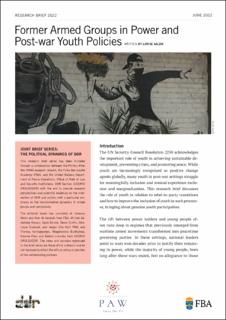| dc.contributor.author | Aalen, Lovise | |
| dc.date.accessioned | 2022-06-27T16:37:09Z | |
| dc.date.available | 2022-06-27T16:37:09Z | |
| dc.date.issued | 2022-01-01 | |
| dc.identifier | oai:www.cmi.no:8379 | |
| dc.identifier.citation | Folke Bernadotte Academy, UN Dept. of Peace Operations, Politics after War | |
| dc.identifier.uri | https://hdl.handle.net/11250/3001120 | |
| dc.description.abstract | This research brief discusses the role of youth in relation to rebel-to-party transitions and how to improve the inclusion of youth in such processes, bringing about genuine youth participation.
There is a growing recognition that youth are key actors in achieving sustainable peace in post-war settings. Still, both national political leaders and international policymakers often see large youth populations as a potential threat to stability. The main youth-centred strategy of former rebel parties in power has been to control and co-opt this population without opening up for genuine youth representation.
This research brief series has been initiated through a collaboration between the Politics After War (PAW) research network, the Folke Bernadotte Academy (FBA), and the United Nations Depart¬ment of Peace Operations, Office of Rule of Law and Security Institutions: DDR Section (UNDPO/OROLSI/DDR) with the aim to provide research perspectives and scientific evidence on the inter¬section of DDR and politics with a particular em¬phasis on the transformative dynamics of armed groups and combatants. | |
| dc.language.iso | eng | |
| dc.publisher | Folke Bernadotte Academy, UN Dept. of Peace Operations, Politics after War | |
| dc.relation.uri | https://www.cmi.no/publications/8379-former-armed-groups-in-power-and-post-war-youth-policies | |
| dc.subject | Youth | |
| dc.subject | Rebel to Party Transformations | |
| dc.subject | DDR | |
| dc.subject | Ethiopia | |
| dc.subject | Mozambique | |
| dc.subject | Uganda | |
| dc.subject | Zimbabwe | |
| dc.title | Former Armed Groups in Power and Post-war Youth Policies | |
| dc.type | Research report | |
